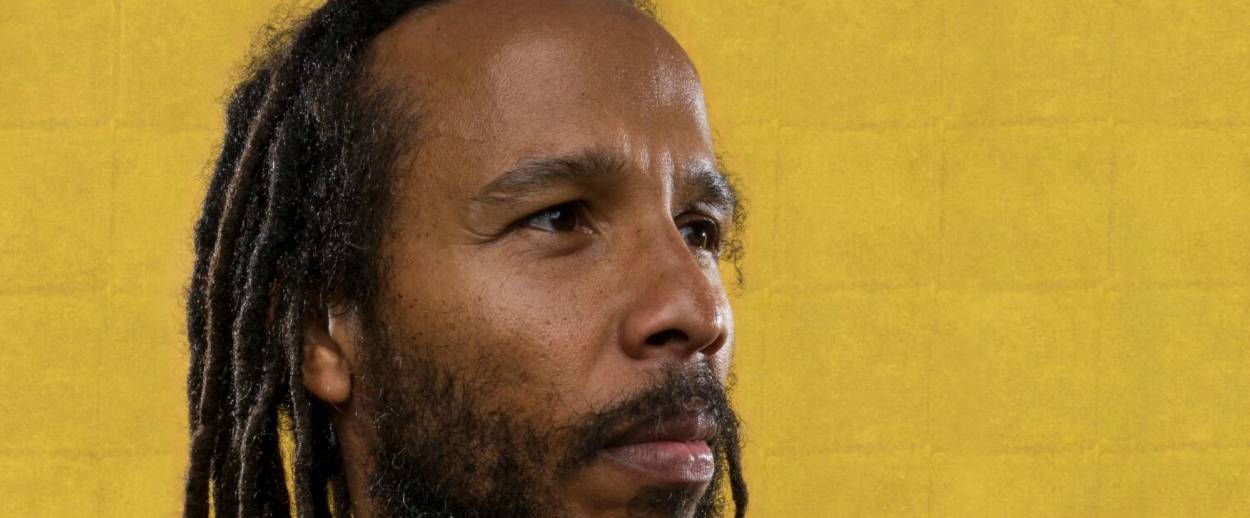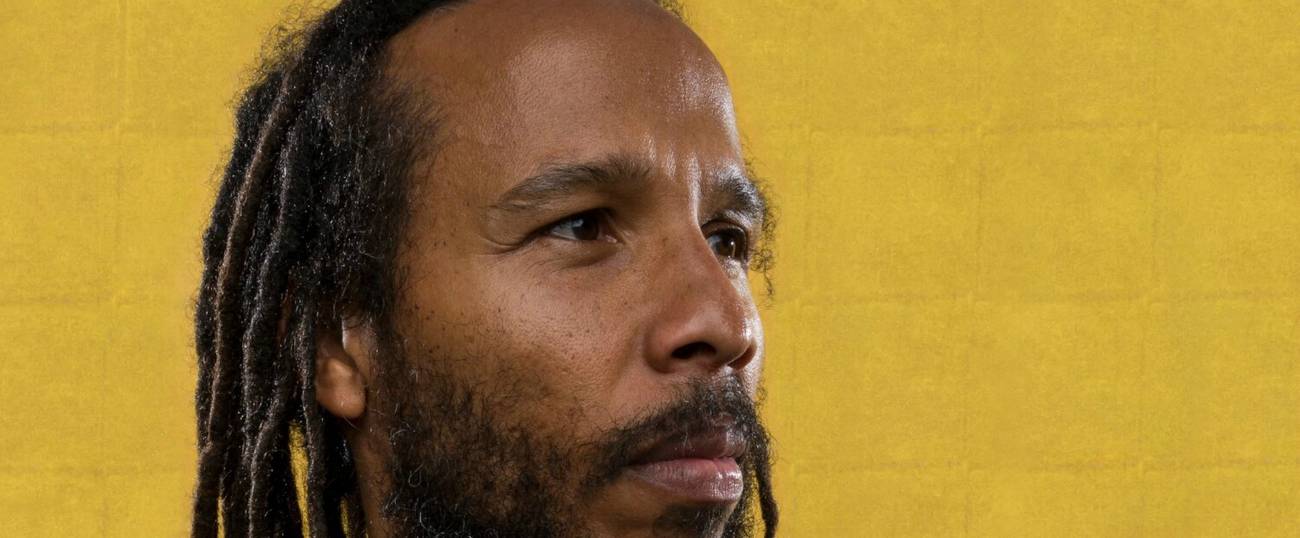High Holidays With Ziggy Marley
“We grew up with the Old Testament, the Tanakh, and I do the apple and honey … I go to temple in L.A.”




Early afternoon this past Friday in an unassuming parking lot by New York City’s Pier 17, where he’d play a rooftop concert later that evening, Ziggy Marley sat in his tour bus on a cushy leather booth seat and steepled his hands over a small table. He’d been on the road across the U.S. and Europe since May playing songs from Rebellion Rises, his new album, and trying to ignite a revolution.
The album, his eighth solo record, conscripts a new generation to resist the political status quo, and in particular, Marley finds direct fuel for his movement in President Trump.
“Trump is actually a good thing in a way, because … it gives us an inside view of what is really going on that we’ve never seen before,” he said. “So he’s showing me things that I’ve never seen before, but I’ve always thought, ‘Hmm …?’”
Marley had suspicions about the unseemly inner thoughts of certain segments of the population, but Trump’s tendency to broadcast racist or xenophobic views have lent credence to his assumptions.
“Now I see it’s real, so [Trump] is actually opening the eyes of the rebellion, showing us the true nature of the system,” he said. “Now he’s not covering it up any more. He’s showing us, and that is a good thing for us. So we have to understand how to deal with that.”
Marley adjusted his military-camo polo shirt (“It’s part of wearing the rebellion,” he said), and spoke about what he wanted to happen in the U.S. and across the world.
“I’m living here in America … and I feel like what I’ve seen was too much divisiveness, too much pitting people against each other, lack of humanity, lack of the empathy and the decency in just how we relate to each other in a way that is positive and progressive instead of repressive and insulting,” he said.
That antagonism is a difficult force to fight against, Marley said, because of special interest groups and politicians beholden to their benefactors.
“There’s too much money in politics,” he said. “Citizens United? It’s bullshit. Wrong. That is a system that creates leaders like Trump. You understand me? It’s the system that creates that and gives them the opportunity to manipulate it.”
When it comes to specific recent instances of rebellion or resistance–Colin Kaepernick’s kneeling during the national anthem and the outcry over the recent Nike ad or the anonymous New York Times op-ed from someone inside the Trump administration–Marley said Trump and other leaders feed off the polarizing controversies.
“It’s the political structure that wants that division, wants to create enemies with each other, because it helps their political agenda and their political careers to demonize another, demonize the next, pit people against each other,” he said. “My album, what we’re trying to do–the rebellion is not a social, political thing. The rebellion is a human thing. The hearts of humanity awaken to the true nature of what really will benefit all of us. What really will benefit humanity as a whole is more love.”
He’s traveled the world for this tour–from Slovakia and Slovenia, new locations for him, to a particularly energetic show in Asbury Park, New Jersey–and realized a particular truth: “What I find is that human beings are human beings. I don’t know why the world is so divided.”
As Marley spoke about the dawn of his political movement, he acknowledged the approach of another fresh start for himself during Rosh Hashanah, the Jewish new year. Marley’s wife, Orly, is Jewish (she was born in Israel to Persian Jewish parents), and they’re raising the four kids they have together, Judah, Gideon, Abraham, and Isaiah, in the Jewish faith. (There are theories that Bob Marley’s father was part Jewish.) “We grew up with the Old Testament, the Tanakh, and I do the apple and honey … I go to temple in L.A.,” Marley said.
Of course, the man who wrote “Love Is My Religion,” has a more widely encompassing vision for his spiritual faith.
“My tradition is love,” he said. “That is my only tradition. That is the only tradition. Everything else is additional to that if I want to. Love is the tradition.”
In terms of his resolution for the new year, he wants to ensure he has himself in the right place to transmit the message of his album. “Humility is a very important thing for me,” he said. “To use my ego wisely and not let my ego use me–that’s a very important thing.”
He did tap into his reading of the psalms to write this album and didn’t rely too much on a particular herbal source of inspiration.
“Smoke–it’s not a necessity for me,” he said. “I do at times, and it does enhance the openness of my mind, but it is not necessary for me. And my inspiration comes naturally for me without I have to do anything. Making these songs alone is like a high. The experience of connecting to that spiritual force that inspires these ideas to give to humanity is a super high.”
For Rebellion Rises, he just had to center himself and rev up the necessary motivation to pass along the message he desired during this critical political moment.
“The inspiration we talk about and the message that we’re giving the people is just like the prophets of old,” he said. “Just like them, get message to give people, we get message to give to the people. We get this message to give to humanity. We’re part of that tradition. We continue that tradition in a more jaded way, because the world is so different now. It’s not so fanciful.”
Next up he’s planning to work on a biopic about his father’s life.
“We’re talking to Paramount right now,” he said. “It’s not fully fleshed out right now or anything. I can just say that we’re in discussions.”
It’s important to manage his father’s legacy with dignity, he said.
“In terms of the movie and stuff, it’s something we have to maintain a balance between what we feel my father’s integrity is and what his philosophy is and make sure we try to maintain that in whatever we do with his image and his name.”
As Yom Kippur approaches (“I’m always constantly kind of keeping myself on track, so that even on the Day of Atonement, I’ve been atoning 365 days already,” he said) and he thinks about the concept of redemption, he’d like to see more conscious engagement among other singers and hopes Rebellion Rises can inspire others to take up the reins.
He said he feels like he’s an old soul who connects more to the music of the ’60s and ’70s. He cited Marvin Gaye and Curtis Mayfield as artists who sang romantic or popular songs but who had “songs of consciousness and impact on society.”
“I feel like the popular music of today is lacking in, I don’t know if it’s bravery or the artists are not willing to put themselves in a place of risk because of commerciality or whatever, but I feel like the music of today, the popular music, is lacking in a rebellious nature that humanity can look to others and be inspired to do something to change the world,” he said.
“We need more musicians and music that is of some substance to it beyond the entertainment factor,” he added. “Who else is out there? I’m looking. I’m trying to find who is out there on the popular music scene that is pushing the right buttons instead of just sailing along smoothly. I would encourage musicians who have billions or millions of people who love them and follow them to use that platform in a different way.”
Ross Kenneth Urken has published in the Wall Street Journal, the New York Times, New York Magazine, The Atlantic, The New Republic, and The Paris Review. He lives in Manhattan.